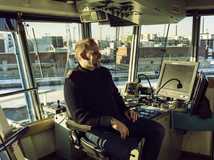Tommy Berg / Helsinki
The ice man
Finland’s icebreakers are crucial for keeping the Baltic Sea navigable and its ports open. Captain Tommy Berg is at the helm of the MSV Fennica. He says keeping the ship on the right course is ultimately a team effort.

Many teams are close-knit. Most, though, do not share a home – and most managers do not eat breakfast, lunch and dinner with their employees. For Tommy Berg, captain of the Finnish icebreaker MSV Fennica, these working conditions are both an advantage and a challenge. While living with his team for weeks on end allows him to focus entirely on the job, it also requires a diplomatic management strategy. “We live half our lives here on the ship and half at home,” Berg tells monocle as he sits in his wood-lined cabin on the second deck of the Fennica, which is currently berthed in the Hietalahti dockyard in Helsinki. “I believe that the time spent here at work should be fulfilling.”
The Fennica belongs to the state-owned Arctia Shipping, which has a fleet of seven icebreakers. Commercial vessels rely on the icebreakers: they ensure that ships are able to reach the harbours even in winter. Outside the icebreaking season the ship can be hired to work elsewhere. During Berg’s two years on the job, trips have taken him to Africa, Greenland, Mexico and Brazil. The Fennica is equipped with a dynamic positioning system that enables the ship to stand still out at sea and be used as a construction platform. Last summer it was rented by Shell to secure the company’s oil and gas production on Alaska’s northern coast.
Berg, who lives with his family in a small village on Finland’s west coast, is one of two captains on the Fennica and usually works three or six-week shifts. The crew consists of 20 people and is divided into three divisions: catering, which looks after cleaning and cooking; the deck, which includes deck officers and crew; and the engine crew.
Coordinating this team is crucial. Before any important decision – when working in challenging shallow waters or pulling up exceptionally heavy anchors, for example – Berg consults his network of experts or the captains of the Fennica’s sister ship, Nordica. “A ship like this is so complicated that there’s no way for you to have all the expertise required to make these [technical] decisions. Most are made in discussions with others,” he says.
Normally, he starts the day by checking in on the different departments and then works from his office – these days, being a captain entails lots of paperwork. “I’m not a big fan of sitting alone in the office,” he says. “Even if I’m not needed, I like to pop in on the commando bridge.”
The long periods spent together and away from friends and family put unusual pressure on the crew. “Being out for weeks is tough. Usually the problems are about not getting along with someone,” he says. “The most important task for a captain is to create an atmosphere where people feel like they’re working together, towards a common goal. So I’ve told everyone that they’re welcome to talk to me; my door is always open. OK, sometimes it might be closed, and that means I need some time for myself.”
Berg has a two-room cabin, consisting of a study-cum-meeting room and a bedroom. During their free time, Berg and the crew use the ship’s gym, watch dvds or do crafts. “Many guys like to make fishing nets, while the women usually knit,” he says. And being a Finnish ship, the Fennica naturally has a sauna – it’s popular, and it’s always warm.
Berg worked his way from a 20-year-old deck officer to captain, an experience he finds invaluable today. At the commando bridge, Berg seems at home, enthusiastically explaining the functions of different buttons and drawing diagrams to show how ships stuck in ice are rescued by the team. Softly spoken but with a natural authority, he seems a perfect fit for the job.
“What motivates people is giving them challenging tasks and responsibility, and then letting them see it through to the end,” he says. “That can still be difficult for me – letting deck officers take care of their work by themselves – but I remember how annoying it was to have a captain breathing down my neck when I was in that position.”
The Rules
What time do you like to be on deck?
At 06:30. I’d prefer to sleep later but I want to start the day at the same time as the crew. That way, you know right away what’s happening.Are tough decisions best taken by just one person?
No. I work with my team.What’s the best way to prepare for leadership: getting a degree or out in the field?
The best way is to start from the factory floor and work your way up.Do you want to be liked or respected?
Liked. It’s important that everything works and that the ship does what it should, but here we also need to be able to live together.What does your support team look like?
The heads of departments onboard and the captains of the sister ship.What technology do you take on a trip?
Just my MacBook and my Nokia E7 phone.Run in the morning?
Yes. I like to run on the gym treadmill, especially during stressful periods. It helps to clear your head.Wine with lunch?
No. If anyone is caught drinking, they are immediately sent packing and picked up by a helicopter.Socialise after work?
Not really. I kind of socialise with them all day long.What is your key management advice?
Try to let people participate in the decision-making process. That leads to the best results.


